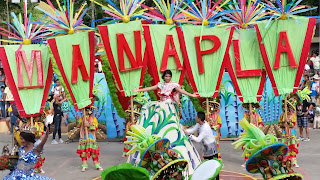'Manlambus: The Festival is Back
The town was known as Manlambus, a Visayan term meaning to strike with a club because its coastal waters were then abundant with fish, catching them could simply be done by using a club or lambus.
.jpg) |
.jpg) Escalante was then a very big town with population
bigger than that of Bacolod until 1939. However, Toboso, one of the biggest barangays of
the town was separated from it in 1948 to be a Municipality by virtue of Executive
Order No. 141 by President Elpidio Quirino decreasing its area and population.
Escalante was then a very big town with population
bigger than that of Bacolod until 1939. However, Toboso, one of the biggest barangays of
the town was separated from it in 1948 to be a Municipality by virtue of Executive
Order No. 141 by President Elpidio Quirino decreasing its area and population.
.jpg) The seat of the Municipal Government was transferred
from Barangay Old Poblacion to Barangay Balintawak per Executive Order 301,
dated
The seat of the Municipal Government was transferred
from Barangay Old Poblacion to Barangay Balintawak per Executive Order 301,
dated
Escalante was converted into a component city of Negros
Occidental when its charter, R.A. 9014 was signed into law on
.jpg) This progressive city is the home of Manlambus Festival
every 30th of May in celebration of its rich cultural heritage and
glorious past that every Escalantehanon loves to share and tell.
This progressive city is the home of Manlambus Festival
every 30th of May in celebration of its rich cultural heritage and
glorious past that every Escalantehanon loves to share and tell.
Now on its 24th year, Manalambus Festival has metamorphosized into a celebration of life, showing thanksgiving of the Escalanatehanons for all the blessings of abundance it has received , recovering from a two year hiatus due to the pandemic which caused border closure and lockdown all over the world. The festival dance appeals to all ages, as movements are simple, easy and expressive.
The performance of seven clustered groups depicts three phases such as the Manlambus , it is the interaction between the upland and coastal inhabitants showing the way they live. The second part is the 'Lambus' artistically acting as if striking a stick on a fish in dance movements. While the third phase would be an interpretation of merry making, thanksgiving showing a festive scene among the dancers with props improvised to show traditional fisher folk and farmers implements matched with colorful non metallic and non-neon costumes. Participating Tribes were Lajambungan, Mapilipa, Malafenob, Aliwacer, Daang Lungsod, Magtam-blay, and Uswag. They were judged according to creativity of dance, choreography, costumes and props, endurance and discipline, as well as the festival princess, merry making and street performance.
The arena and street dance only lasted for less than three hours, but the community participation was evident in the way the festival was done spearheaded by the teachers of the Department of Education, chaired by no less than Dr. Glicerio Aligato and co-chaired by Myla Delos Santos and Jem Rymon Chien. The choreographers, costume designers, parents and classmates, the Kabalikat Civicom and Traffic Enforcers for proper peace and order, the city government employees, and of course my dear friend Dr. Vermont Juvahib for the Manlambus song that was used all day for the dance. Its good they had it recorder or he might have lost his voice in the end. Escalante Manlambus atong Kagikan...Dali nah Maghiliusa, Dali nahhhh Maglipay ta!
.jpg)
.jpg)
.jpg)
.jpg)
.jpg)




Comments
Post a Comment